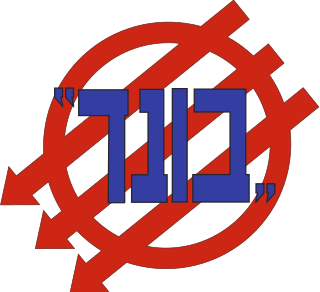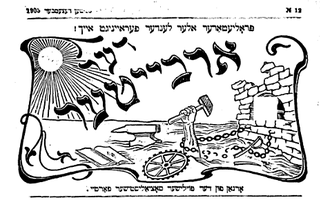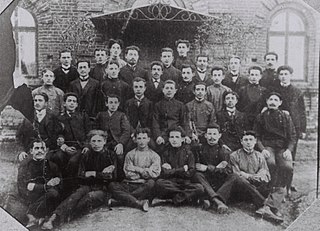Bund, BUND, or the Bund may refer to:
The Folkspartei was founded after the 1905 pogroms in the Russian Empire by Simon Dubnow and Israel Efrojkin. The party took part in several elections in Poland and Lithuania in the 1920s and 1930s and did not survive the Holocaust.

Arbeiterstimme was the central organ of the General Jewish Labour Bund in Lithuania, Poland and Russia. It appeared from 1897 to 1905, as an underground publication. The Bund resumed the publication, now as a legal paper, after the February revolution.
The Communist Bund (Kombund) was a Jewish political party in Soviet Russia 1920-1921, representing the pro-Bolshevik majority wing of the erstwhile General Jewish Labour Bund. Esther Frumkin and Aron Isaakovich (Rakhmiel) Vainsthein were the key leaders of the Communist Bund.
The Jewish Communist Labour Bund in Poland, generally referred to as the Kombund, was a Jewish political party in Poland. It was formed in 1922, after a split from the General Jewish Labour Bund in 1921. The split was provoked by disagreements over whether the Polish Bund should join the Communist International. At the first Polish Bund conference in 1920 a majority resolution passed, calling for the party to join the Communist International. The decision was never executed however, leading to the split and the formation of Kombund. The Kombund was founded in late January 1922, by Communist Bundist groups. The new party affiliated itself to the Communist International, adopting the twenty-one conditions. Around 25% of the Bund membership in Poland joined the Kombund.
The Folkstsaytung was a Yiddish language daily newspaper which served as the official organ of the General Jewish Labour Bund in Poland. Folkstsaytung was published from Warsaw. It began publication in 1921 and officially lasted until the Nazi invasion of Poland in 1939. Thereafter it continued on as an illegal underground newspaper until 1943. Its chief editors were Victor Alter and Henrik Erlich. In 1927 it was renamed Naye Folkstsaytung. It began to be published again after World War II but in 1948 it was taken over by Communist authorities and disbanded.
Lodzer veker was a newspaper of the General Jewish Labour Bund in Łódź, Poland. In 1922, it was taken over by the Jewish Communist Labour Bund. The General Jewish Labour Bund restarted the newspaper in October 1926, as a weekly.
The General Jewish Labour Bund in Latvia was a Jewish socialist party in Latvia, adhering to the political line of the General Jewish Labour Bund and existed from 1919 until 1940, when it was banned shortly after the Soviet occupation of Latvia in 1940.

The General Jewish Labour Bund in Poland was a Jewish socialist party in Poland which promoted the political, cultural and social autonomy of Jewish workers, sought to combat antisemitism and was generally opposed to Zionism.

Der arbeyter was a Yiddish-language newspaper, issued by the Polish Socialist Party (PPS). The newspaper was launched in 1898, named after a Galician Jewish social democratic publication by the same name. Der arbeyter was initially published from London.

Klain Bund was a youth organization in the Russian empire, connected to the General Jewish Labour Bund in Lithuania, Poland and Russia. Klain Bund was founded in 1903.
The General Jewish Labour Bund in Lithuania was a Jewish socialist party in Lithuania, adhering to the political line of the General Jewish Labour Bund.
The General Jewish Labour Party was a Jewish socialist political party in Poland. The party was founded in Lvov in November 1931 by a leftwing group of the General Jewish Labour Bund in Poland in East Galicia, which upheld the idea of dictatorship of the proletariat, a faction of the Poale Zion Left and young left-wing Zionists. The party was aligned with the Communist Party of Poland. The party called for a workers government, equality for Jewish working people, education in Yiddish language for Jewish children in state schools, abolition of discrimination in the labour market and to struggle against anti-semitism.
The Russian Social Democratic Labour Party (Mensheviks) was a political party in Russia.

Arkadi Kremer was a Russian socialist leader known as the 'Father of the Bund'. This organisation was instrumental in the development of Russian Marxism, the Jewish labour movement and Jewish nationalism.

Bundism was a secular Jewish socialist movement, whose organizational manifestation was the General Jewish Labour Bund in Lithuania, Poland and Russia, founded in the Russian Empire in 1897.

Poale Zion was a movement of Marxist–Zionist Jewish workers founded in various cities of Poland, Europe and the Russian Empire in about the turn of the 20th century after the Bund rejected Zionism in 1901.
The General Jewish Labour Bund in Lithuania, Poland and Russia, generally called The Bund or the Jewish Labour Bund, was a secular Jewish socialist party initially formed in the Russian Empire and active between 1897 and 1920. In 1917 the Polish part of the Bund, which dated to the times when Poland was a Russian territory, seceded from the Russian Bund and created a new Polish General Labor Bund which continued to operate in Poland in the years between the two world wars. The Russian Bund was dissolved in 1920 and incorporated into the Communist Party. Other remnants of the Bund endured in various countries. A member of the Bund was called a Bundist.
The 4th Central Committee of the Russian Social Democratic Labour Party was elected by the 4th Congress, and was in session from 1906 until 1907.
Folkstsaytung was a Yiddish language newspaper published from Kiev. The first issue of Folkstsaytung was published on August 8, 1917. It was the organ of the South Russia Regional Committee of the General Jewish Labour Bund in Lithuania, Poland and Russia. Moisei Rafes was the editor of the newspaper. From its seventh issue, it appeared as a daily newspaper.



